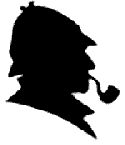 Was Sherlock Holmes a real person?
Was Sherlock Holmes a real person? The simple answer is “no, not exactly, but there is the person of Dr. Joseph Bell”. So who is this guy and what do I think…
On day in Scotland, while seated around a warm fire, a group of some twelve friends were discussing the several famous unsolved crimes that were in the news of the day. One guest had the others starring wide eyed with his deductive acrobatics. This man, who commanded the attention of all the other guests was Doctor Joseph Bell, an eminent surgeon whose dazzling classroom wizardry influenced decades of Edinburgh University students, including one Arthur Conan Doyle who would go on later to create the famous detective Sherlock Holmes.
Bell was thirty-nine years old when Conan Doyle first attended one of his 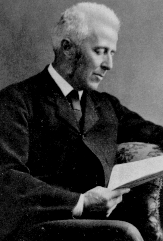 lectures. It is said that Bell was known to have walked with a jerky kind of a gait that publicized his great energy. His nose and chin were angular and his eyes brightly twinkled with shrewdness. In addition to being a brilliant doctor, Bell was also an amateur poet, a musician, a sportsman and a bird-watcher.
lectures. It is said that Bell was known to have walked with a jerky kind of a gait that publicized his great energy. His nose and chin were angular and his eyes brightly twinkled with shrewdness. In addition to being a brilliant doctor, Bell was also an amateur poet, a musician, a sportsman and a bird-watcher.
By the end of Conan Doyle's second year Bell had selected him to serve as an assistant in his ward. This gave Conan Doyle the opportunity to view Dr. Bell's remarkable ability to quickly deduce a great deal about a patient.
“Most people see but do not observe,” Bell once commented, “Glance at a man and you find his nationality written on his face, his means of livelihood on his hands and the rest of his story in his gait, mannerisms, watch-chain ornaments and the lint adhering to his clothes.”
Bell could tell patients their habits, their occupations, nationality, and often their names, and rarely, if ever, made a mistake. "In teaching the treatment of disease and accident," Dr. Bell stated, "all careful teachers have first to show the student how to recognize accurately the case. The recognition depends in great measure on the accurate and rapid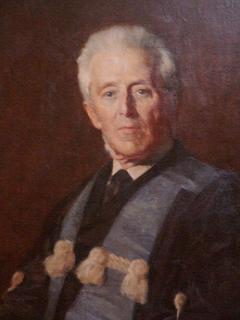 appreciation of small points in which the diseased differs from the healthy state. In fact, the student must be taught to observe. To interest him in this kind of work we teachers find it useful to show the student how much a trained use of the observation can discover in ordinary matters such as the previous history, nationality and occupation of a patient."
appreciation of small points in which the diseased differs from the healthy state. In fact, the student must be taught to observe. To interest him in this kind of work we teachers find it useful to show the student how much a trained use of the observation can discover in ordinary matters such as the previous history, nationality and occupation of a patient."
Telling the House Surgeon to usher in a new patient, he delighted in putting the deductive powers of the student to the test, with results generally amusing, except to the poor student victim himself.
"What is the matter with this man, sir?" he inquired "Come down, sir, and look at him! No! You mustn't touch him. Use your eyes, sir! Use your ears, use your brain, your bump of perception, and use your powers of deduction."
After looking at the patient the student replied: "Hip-joint disease, sir!"
"Hip-nothing!" Bell retorted. "The man's limp is not from his hip, but from his foot, or rather from his feet. Were you to observe closely, you would see that there are slits, cut by a knife, in those parts of the shoes where the pressure of the shoe is greatest against the foot. The man is a sufferer from corns, gentlemen, and has no hip trouble at all. He has not come here to be treated for corns, gentlemen. We are not chiropodists. His trouble is of a much more serious nature. This is a case of chronic alcoholism, gentlemen. The rubicund nose, the puffed, bloated face, the bloodshot eyes, the tremulous hands and twitching face muscles, with the quick, pulsating temporal arteries, all show this. These deductions, gentlemen, must, however, be confirmed by absolute and concrete evidence. In this instance my diagnosis is confirmed by the fact of my seeing the neck of a whiskey-bottle protruding from the patient's right-hand coat pocket.”
From close observation and deduction, gentlemen, you can make a correct diagnosis of any and every case. However, never neglect to ratify your deductions, to substantiate your diagnosis with the stethoscope, and by other recognized and every-day methods of diagnosis."
Of another patient he would say, "Gentlemen, we have here a man who is either a cork-cutter or a slater. If you will only use your eyes a moment you will be able to define a slight hardening--a regular callous, gentlemen--on one side of his forefinger, and a thickening on the outside of his thumb, a sure sign that he follows the one occupation or the other." Another time, "Gentlemen, a fisherman! You will notice that, though this is a very hot summer’s day, the patient is wearing top-boots. When he sat on the chair they were plainly visible. No one but a sailor would wear top-boots at this season of the year. The shade of tan on his face shows him to be a coast-sailor, and not a deep-sea sailor--a sailor who makes foreign lands. His tan is that produced by one climate, a 'local tan,' so to speak. A knife scabbard shows beneath his coat, the kind used by fishermen in this part of the world. He is concealing a quid of tobacco in the furthest corner of his mouth and manages it very adroitly indeed, gentlemen. The summary of these deductions shows that this man is a fisherman. Further, to prove the correctness of these deductions, I notice several fish-scales adhering to his clothes and hands, while the odor of fish announced his arrival in a most marked and striking manner.
On one occasion he called upon a student to diagnose a case. The student made a miserable failure of it.
"Get out your notebook, man," said Bell, "and see whether you can't express your thoughts that way." Then, turning to the class, the Professor continued: "The gentleman has ears and he hears not, eyes and he sees not! You come from Wales, don't you, sir?"--again turning to the poor victim--' 'I thought so! A man who says 'silling' for shilling, who rattles his K's, who has a peculiar, rough, broad accent like yours, sir, is not a Scotchman. You are not an Irishman! You are not an Englishman! Your speech 'smacks of Wales.' And to clinch the matter, gentlemen' '--once more addressing the class--"when I asked Mr. Edward Jones--that is his name, gentlemen--to transfer his thoughts to paper, he nervously pulled out his notebook, and, to his chagrin, with it a letter. Mr. Jones endeavored to palm the letter, gentlemen; but he is evidently a little out of training at present, as he blundered most beautifully. The postmark shows that the letter was posted yesterday morning at Cardiff. The address was written by a female-undoubtedly Mr. Jones's sweetheart-for the very sight of it caused our friend to blush furiously. It was addressed to Mr. Edward Jones! Now, gentlemen! Cardiff is in South Wales, and the name Jones proclaims our friend a Welshman."
Doyle Graduated f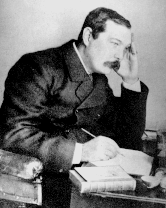 rom Edinburgh University in 1881 and spent six years trying to earn a living as an oculist, desperate for any income at all he turned to writing. He tried once and failed but he did not give up. “I wanted to try a detective story and wanted a new kind of detective.” He said. “I thought of my old teacher, Joe Bell. If he were a detective, he would surely reduce this fascinating but unorganized business to something nearer an exact science.”
rom Edinburgh University in 1881 and spent six years trying to earn a living as an oculist, desperate for any income at all he turned to writing. He tried once and failed but he did not give up. “I wanted to try a detective story and wanted a new kind of detective.” He said. “I thought of my old teacher, Joe Bell. If he were a detective, he would surely reduce this fascinating but unorganized business to something nearer an exact science.”
Thus was born the great Sherlock Holmes! I love stories like this. These are why I invite you to keep an open mind and keep walking in this big weird world of ours!
I’m Average Joe
email: OurWeirdWorld@gmail.com

 lectures. It is said that
lectures. It is said that  appreciation of small points in which the diseased differs from the healthy state. In fact, the student must be taught to observe. To interest him in this kind of work we teachers find it useful to show the student how much a trained use of the observation can discover in ordinary matters such as the previous history, nationality and occupation of a patient."
appreciation of small points in which the diseased differs from the healthy state. In fact, the student must be taught to observe. To interest him in this kind of work we teachers find it useful to show the student how much a trained use of the observation can discover in ordinary matters such as the previous history, nationality and occupation of a patient." rom
rom 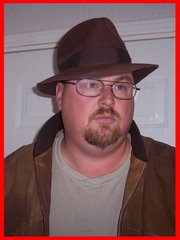
No comments:
Post a Comment